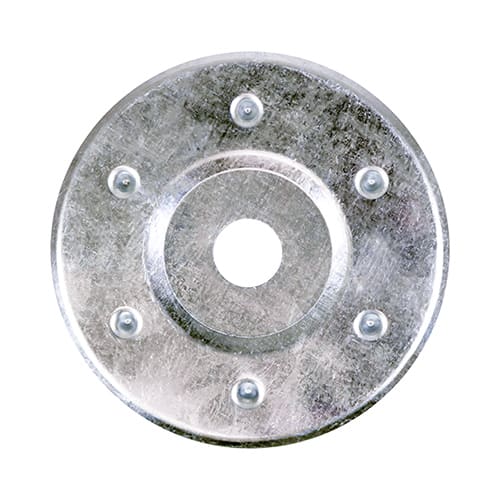Insulation Fixings & Screws
(20 Products)Insulation fixings and screws are essential components in construction and building projects where insulation materials are applied. These products are specifically designed to secure insulation boards to a variety of substrates, ensuring stability and optimal thermal performance. Available in various materials, sizes, and types, insulation fixings and screws contribute to energy efficiency, reduced heat loss, and structural integrity in buildings.
What are Insulation Fixings & Screws?
Insulation fixings and screws are specialised tools used to secure insulation boards and insulation materials in place. These products vary in material composition, including plastic, galvanised steel, and stainless steel, designed to suit different environmental and load-bearing requirements. Insulation fixings often feature a washer or anchor component, which helps distribute weight and secure insulation boards firmly against walls or other surfaces.
Types of Insulation Fixings & Screws:
- Plastic Insulation Fixings: Lightweight and corrosion-resistant, ideal for attaching insulation materials to masonry and concrete substrates.
- Metal Insulation Fixings: Metal insulation fixings are commonly used for securing fireproof insulation boards and panels. For exterior fire-resistant insulation, stainless steel fixings are recommended due to their durability.
- Insulation Screws: Typically used with insulation boards and plasterboards, these screws come in various lengths.
Where are Insulation Fixings & Screws Used?
Insulation fixings and screws are widely used in residential, commercial, and industrial construction projects, particularly in insulation applications. Common areas of application include:
- External Wall Insulation Systems: Fixings secure insulation boards to external walls, contributing to improved thermal performance.
- Roofing and Ceiling Insulation Projects: Insulation fixings help secure materials that prevent heat loss through roofs and ceilings.
- Substrate Attachment: Used with substrates like plywood, concrete, wood, bricks and blocks, ensuring insulation remains stable over time.
Benefits of Insulation Fixings & Screws
Using insulation fixings and screws when fitting insulation provides several advantages in construction projects. Here are some key benefits:
- Energy Efficiency: Properly secured insulation materials minimise heat loss, enhancing overall energy efficiency in buildings.
- Structural Stability: Insulation fixings and screws maintain the position of insulation boards and plasterboards, adding durability to the insulation layer.
- Thermal Performance: By reducing thermal bridging, these fixings support consistent temperature control and improve thermal performance.
- Corrosion Resistance: Options like stainless and galvanised steel fixings offer long-lasting resistance to corrosion, especially in damp or external environments.
- Versatility: A variety of sizes and materials allows these insulated fixings to be suitable for different insulation materials, thicknesses, and substrates, providing solutions for diverse insulation applications.
Common Types of Insulating Fixings
- Hammer Fixings - A convenient and speedy solution that typically includes a reliable nylon plug as well as either a nail or screw. The pre-assembled nature of these fasteners makes installation incredibly swift. Hammering in the nail screw causes the plug sleeve to expand, thus ensuring a solid and reliable hold within whatever building material it is used in.
- Screw Fixings - Constructed from metal, screws are effective fasteners that feature an external helical ridge known as the male thread. Its distinct design allows it to securely hold materials together in even the toughest applications. You can find screws for a variety of purposes, from drywall and windows to roofing and deck building. Screw fixings are available in different lengths and diameters to suit various insulation thicknesses.
- Insulation Anchors - Used to hold an insulated board in place on masonry, concrete, and steel surfaces.
Choosing the Right Insulation Fixings & Screws
When selecting insulation fixings and screws, factors such as substrate type, insulation material, load requirements, and environmental conditions should be considered. Different sizes and materials are available to meet the demands of specific insulation projects.
For efficient installation, it’s important to choose fixings that match the insulation board thickness and substrate type, ensuring stability and thermal efficiency. Properly chosen insulation fixing components can make a significant difference in the durability and performance of any insulation project.
Frequently Asked Insulation Screws & Fixings Questions
What Are Some Common Types of Mechanical Fixings?
- Screws
- Nails
- Bolts
- Washers
- Anchors
- Rivets
How To Differentiate Between Fine Threads & Coarse Threads?
The threading must be deep set and broad in order to be deemed "Coarse". Fine-threaded fasteners, on the other hand, will have narrower, shallower ridges and a greater number of threads per axial distance.
How Do You Refer To The Ridges On A Screw?
The standard industry term for these ridges is threads.
What Is The Difference Between A Fastener & A Fixing?
A fastener joins two formerly separate components together while fixing is more a method of securing an object in place. It refers to the process as opposed to the actual component.
Is There Such A Thing As Fire Proof Insulation Fixings?
A fire proof insulation fixing is a common feature in properties which value fire performance. There are several screws on the market which are fire-rated.





.jpg)





